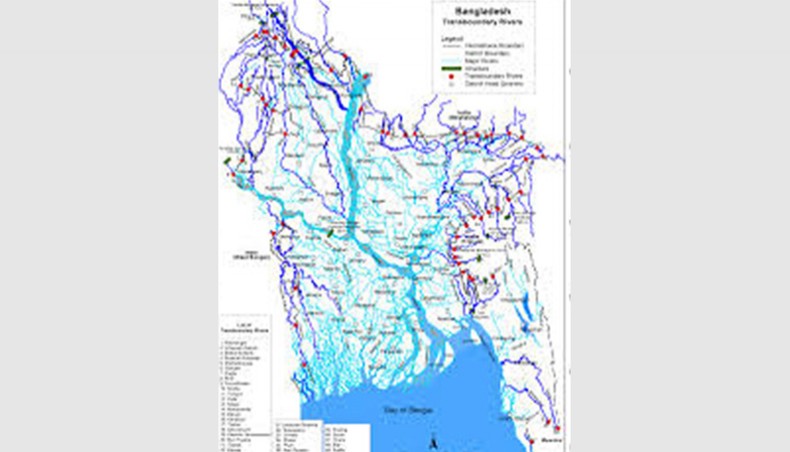16 new transboundary rivers identified
Bangladesh has requested India to bring sixteen rivers, newly identified as transboundary rivers, under the purview of the Joint Rivers Commission of the two countries for maximising benefits from the common river systems.
‘The process for official recognition of the 16 rivers as transboundary rivers and bring those under the JRC mandate is on,’ said state minister for water resources Muhammad Nazrul Islam told New Age at his office in Dhaka on Tuesday.
Bangladesh has provided all information and findings on the 16 rivers to India, he said.
Newly identified transboundary rivers in the eastern region are Karnajhora, Sribardi-Jhenaigati, Maharashi, Updakhali (Ganeswari), Kharno-Balja (Mangaleswari), Mahadeo, Mahishkhula, Rangah-Bagli, Khasimara, Chela, Jaliachara and Lubha in the north-east zone, and Lohar in the south-east zone and Karnaphuli in the eastern hill region.
Newly identified transboundary rivers in the western region are Hariabhanga in the south-west zone and Sankosh/Ghangadar in north-west zone.
The Centre for Environmental and Geographic Information Services, an independent research organisation established by the government, identified the 16 rivers as transboundary rivers in addition to 57 common rivers.
Centre for Environmental and Geographic Information Services deputy executive director Malik Fida A Khan said that they prepared basic documents for about 46 common rivers, including 10 newly identified transboundary rivers, based on data and information on catchment areas of the rivers concerned, physical length, width and nature of the rivers concerned, population, pattern of agriculture and livelihood in respective areas so that the country can maximise benefit in bilateral negotiations under international laws.
India and Bangladesh share 54 common rivers of which agreement has been reached only on sharing of water of the river Ganga, based on a sharing formula of the flows measured at Farakka, during the lean season each year, from January 1 to May 31. The 30-year treaty signed in 1996 is renewable by mutual consent.
India has been dillydallying for over five years on signing agreements on the sharing of waters of Teesta and Feni rivers, in spite of formal directions from the highest political levels during Indian prime minister Manmohan Singh’s visit in Dhaka in September, 2011, for making the deals on fair and equitable basis, reached through protracted negotiations continued for several decades.
During the visit, the two prime ministers welcomed the progress made on the principles and modalities of interim agreements on sharing of waters of Teesta and Feni rivers. They directed the officials concerned to work towards concluding the agreements at the earliest.
Indian state minister for external affairs MJ Akbar, at a press conference on January 4, hoped that the two countries would be able to sign an agreement on the Teesta River during the visit of prime minister Sheikh Hasina to New Delhi, expected to be held in February.
Bangladesh state minister Nazrul Islam said that MJ Akbar’s statement was not ‘casual remarks.’
Bangladesh also shares Sangu, Matamuhuri and Naf rivers with another neighbour Myamar.
- See more at: http://www.newagebd.net/article/6704/16-new-transboundary-rivers-identified#sthash.nHZshg1a.dpuf











